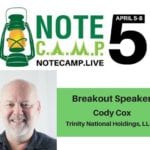
Gail Villanueva and Cody Cox discuss some things you could do when life throws you curve balls, because in life, sometimes you have to be Semper Gumby. If you aren’t flexible and adaptable both in life and in the note business, then it’s going to be very difficult. Curve balls can happen sometimes, both as personal and professional events. From a note perspective, you go through training, you build your processes, and you have this plan in mind when you enter into purchasing a note. You begin with the end in mind, and so you know where you’d like to go. However, deals don’t always follow the path that you’ve envisioned from the beginning, and so you have to deal with those changes as they happen.
—
Listen to the podcast here
When Life Throws You Curve Balls with Gail Villanueva and Cody Cox
We’re going to be talking a little bit about when life throws you curve balls. Both Cody and I are very familiar as many of you are of when that can happen. Cody, welcome.
It’s great to be with you on the podcast. I’m really pleased to be able to get on this.
Talk about throwing curve balls, with your schedule and my schedule sometimes that happens in real life. We’ve got quite a few both personal and professional events that have occurred not only of late but generally in life, that definitely proved that sometimes you have to be, as we used to call at NASA, Semper Gumby, because if you aren’t flexible and adaptable, then both in life and in the note business is going to be very difficult.
Both those words you used there are flexible and adaptable are the optimal words because from a note perspective, we go through our training, we build our processes and we have this plan in mind when we enter into purchasing a note. We get this little vision and we’ve heard the term, “To begin with the end in mind.” We know where we’d like to go, but the deal of it is, it doesn’t always get that way. It doesn’t always follow the path that we’d envisioned from the beginning. We have to be flexible and adaptable to deal with those changes as they happen.
I know that you had mentioned when we were talking about this, getting ready for this podcast, that you’ve had some situations that you might want to share with everyone regarding that need to be flexible and adaptable.
Some of them are good and some of them are a struggle. One of the ones that are good is, I have this house that we took as an REO in Cleveland, Ohio. It was one that the people who had owned the house had passed away and inevitably it was going to go through the foreclosure process, because nobody in the family or whatever stepped up to try and stop it or claim it or whatever. I also had been referred over to a potential rehabber that was close to the house. He also is a City of Cleveland police officer. He was able to cruise the house by me every now and then. It always seemed like somebody was in the house. It always seemed somebody was living in it, occupied, but we never knew who it was.
Finally, I had contacted this guy. I told him that I was ready to try and liquidate it. If he could go by and take a look at it and see what it looked like. We did and he says, “Somebody is still in this house. The lawn is being taken care of. There’s a car on the driveway.” I ordered a property inspection to go out and do a door knock and found out that the former homeowner, that people that had passed away, their eldest daughter was living in the house. These folks had bought the house in 1977. It was part of their family for a long, long time. This particular oldest daughter had lived in the house for a little over a year. She had some major back surgery, so she was convalescing in the home. I sent her a letter and says, “I know you’re in the house. I’ve got to do something with it. Can you give me a call and figure out what’s the best thing to do for the house?” About two weeks later, she gave me a call. She took a risk because she had no idea what the call was going to be about.
We started talking about it and I basically told her, it’s not my real interest to try and get them out of the house because you’re taking care of it. The house is good, but would they want to buy that house? She said, “Let me think about it.” Let me talk to her husband. She said that anytime it seemed like they were ready to move out of the house, something happened that kept them in the house for a little while longer. I said, “Maybe you’re supposed to be there.” I gave her until this coming Friday and I think that they’re going to end up buying this house from me. I told her we’d carry the paper. We just transferred the title, they wouldn’t have to go out for financing or any loan and pay us off. We’ll figure that out. That looks like it might come together. That looks like a very nice deal that’s going to come together. I know my investor on this particular transaction has been asking me, “Where at you now? What’s going on?” Hopefully, that’s a curveball that I hit, at least for a single at this particular point in time. Then I have a curveball that I whiffed on. It’s still not over with.

When Life Throws You Curve Balls: From a note perspective, we go through our training, we build our processes and we have this plan in mind when we enter into purchasing a note.
I bought a note a little over a year ago. It’s about fourteen, fifteen months ago in Illinois. It was little two-family and I thought that the homeowner, the guy who owned the house, wanted to keep his rental house, but he basically gave up on everything. He disappeared. The taxes went delinquent. I had to bring the taxes out from being foreclosed on. I heard there was some code violations and I finally negotiated with the City in Illinois. They’re going to cut the code violations in half. There’s a water bill that hadn’t been paid for a year and a half. They’re going to cut that in half and we’re finally getting to the point where we can record the deed. I can take ownership of it and I can do whatever I need to liquidate that one. That one’s a little bit of a money pit. That one there is one that basically has cost us a little bit more money than we had budgeted for, but the value is still there. We probably have a little rehab work to go, but maybe instead of whiffing on that one, it was a foul tip. I fouled it off into the right grandstands, so I’d get another swing. What about you? What things have you got as far as curveballs go?
I’m still recovering from a curveball, although this is more on a personal nature as you and I were talking, my husband and granddaughter were flying up to Birmingham to see his mom for a week and help her. She had this long honey do list of things for my husband to take care of. I track all of our flights on FlightAware. I keep seeing these delays and delays. I’m seeing the clouds building, which often happens here in central Florida. The long and short of it, what happened was their flight kept getting delayed to the tune of we decided to call it. There’s a point where you have to call it and move on.
Being the daughter of a pilot, I know that you always want the optimum conditions if you can. We cancelled the flight. I got a notification at midnight that the flight was completely cancelled. They got vouchers which ended up being a bonus round out of that whole event. It shows that sometimes you have to look at the signs, in my case it was building a weather up to about 50,000 to 60,000-foot thunderheads that made us do ahead and do a course correction. I think they’re going up there instead. It’s like investments too. You have to look at those what we call alligators in your portfolio to decide if it’s worth trying to recover or cut your losses and move on. Knowing you, Cody, it sounds like you land on your feet a lot of times when you have a situation, but you and I both carefully weigh before we decided to call a timeout or a ground ball on something. I’m not good at baseball analogies.
A lot of it is what you do when you’re standing on deck and it’s your turn. The thing with it, it’s a team effort. Not only it’s the team effort with the folks at the WCN Crew and Scott and his team, but it’s a team effort with the folks that we have in our own lives, with my wife and my son and how they’ve engaged with what we’ve got going on. Oftentimes, they’re very comfortable in delegating some tasks to them so they can take care of. My schedule here, because at least for those of us that are driving towards a goal, we often have a tendency to over schedule ourselves. When I find myself juggling two schedules, sometimes I liken it to riding a unicycle blindfolded while juggling. I had a big presentation in front of the Northwest REIA group here in Portland.
You hit that out of the ballpark. I know you and I also saw that crowd because you posted photos.
It was packed. We had a good crowd and I had a lot of people come up afterwards. I’ve got some folks emailing me, trying to find a way to either get on my weekly newsletter or get involved from a joint venture status. It turned out really good. We had a busy weekend and then, I left my home, which is a suburb of Portland, Oregon at 6:45 AM all the way East to a place called La Grande, Oregon. I got to pass the Idaho potato truck too. I had some pictures on Facebook about that. I did a presentation to a group of realtors in La Grande and then drove over here to Baker City. I’m in a little town in Northeastern Oregon, Baker City.
As I was telling George, this is where the old movie, Paint Your Wagon, was filmed years and years ago. I’m far up in the mountains in Northeast Oregon and it’s a beautiful day. When I’m finished with this, I’ve got to run over and I do my quarterly presentation for the Veterans’ Advisory Committee. I’ve got another presentation at 1:00 here in Baker City. Then I got to try and find a way to get home and it’s about a six-hour drive one way. One of the things you and I talked about, when we talked about life throwing us curveballs, the other word in there is life because there’s a lot of life that we have to do that’s outside of what we do on a note investing standpoint.
I’m getting a lot of conversation about wanting to get involved. They’ve got some assets that I’m going to start looking at. I’m saying, “How do I structure in my mind in my day coming up, because I have another event that I’m going to on Thursday when I can do the due diligence process to try and narrow those 500 assets down to a dozen.” I know there’s been some conversation about time blocking. I think time blocking has a lot of merit. It keeps people on track but you and I, we talked about this, we’ve got to be flexible and adaptable. Sometimes we have to vary outside of what time block criteria we have to take care of the things that matter. That’s a little rant I’ve got going on about this thing called life as we’re trying to develop our note business and all the other things that go on. You had to drive to wherever you get, George. Those things come up on a daily basis. We need to be adaptable and flexible in order to accommodate what we’re supposed to accommodate.
If I can take one for the team, if you have a little bit of trouble doing that due diligence, I can help you out with that. One of the cool things about our WCN Crew is that we have a very tight cadre of folks that we personally build relationships with because this is a relationship business, that we can count on and rely on. It’s coopetition because we aren’t looking at the same markets. We are not looking at the same asset managers. We don’t all have the same criteria. We’re not vying for the same assets like I was back in the day when I was a fix and flipper.
I talk about that like it’s ancient history because it is ancient history, although I still loved it. We do have folks that we can call on and rely. I called you and asked your opinion on certain things. One day, I hope to pay it forward and be able to do that for you. A new note investor. I talked a little bit on one of the podcasts about the work-life balance because I read somewhere that procrastination is sometimes when we put so much on our plate, we don’t know where to begin so we don’t begin with anything.
Sometimes you have to take that first step. I have a theory and I wasn’t able to listen to a lot of the previous podcasts and I have a little bit of a theory about this work-life balance that you mentioned because it’s a real important, but it comes in cycles. I don’t think the work-life balance can happen simultaneously. There’s going to be periods in our work where we have to focus on work and unfortunately some of the other aspects of life get deferred for a little bit. Then if we do it right, if we spend the next 60 days going like crazy, putting our head down, trying to buy ten assets and all the due diligence and all the stuff that goes on with that, getting the joint ventures, doing the wires, getting set up with the servicer and all the things that we have to do, we spent 60 days focusing on that.

When Life Throws You Curve Balls: It’s a matter of having that type of structure that you can manage the things yourself rather than having other people manage things for you.
You would look at that and say that your work-life balance is out of balance. When you’re finished with that 60 days and now you’re able to go over to that life part of things and get back in sync with your family and make up some of the promises that you’ve made for them, that you can get back and we can go to this place. My wife has been talking to me about we need to go away for about a weekend here and I’m thinking we do. We need to go away and spend about three or four days somewhere, off in the wilderness or at the beach or something like that to escape the city and escape all this stuff. We’re going to do that, but this week and next week is a different story.
I have our anniversary’s coming up. She probably thought I forgot, but I didn’t. A lot of those things are on your mind. That’s part of how to deal with the curveball. You try and pick the scenes up as it’s curving into you and then taking a good, qualified swing at the pitch and keeping all these things into account so that, “I need to do this, I need to do that,” and then set up the priorities in your mind, and priority shifting. That’s going back to what you started the whole thing off, being flexible and being adaptable. I don’t think you could start off a podcast any better than those two words.
Thank you for that, Cody, I appreciate that. Do you take a day off a week or do you work seven days a week?
I usually try and take off Saturday afternoon in some fashion and Sunday afternoon in some fashion with the exception of that’s when I get my emailer out. I try and get that out by 5:00, 6:00, 7:00 on Sunday evenings. It’s now become part of what we do at our household. I used to take Fridays off as much as I could. The work life part of it with my day job has prohibited that in a lot of ways, although I do have some time off that I have to take before the end of this month. I’m going to take that off a little bit later on and I hope there will be some time that my wife and I can sit on the back deck and have a hot tea.
It would be a good time to take that off for your anniversary, possibly?
Possibly. It might be the following weekend, but I’m not quite sure. I’d have to see how that goes, but it might work that weekend as well. It’s sitting on the curveball and trying to pick up the scenes and taking a qualified, quality swing at the pitch. I’m glad Scott got us started on this baseball analogy after his Monday night.
We had to come up with something to punch through but it was great. I do take one day a week off. I tend to take Sundays off now. I do take ten, fifteen minutes, maybe put together a noteworthy nugget. I’m trying to get that out as bi-weekly, but I had to decide that I was going to take one day off a week. Family day, we go to church and I just chill. I put it into my mind that I’m going to take Sunday off. I’ve also told my family, “If I get a call and it’s a matter of I’m going to lose a deal or if it’s something that could affect income coming in, I’m going to have to go ahead and change it and go ahead and work.” A friend of mine told me about this. He said, “If you take off one day a week, it refreshes and recharges you.” By the time Monday comes around, I’m out the gate ready to go and I go full speed ahead. I commit what I want to do on paper trying to get it up until Saturday at midnight, writing down what I want to accomplish the following week but I take a break. I chill one day a week.
You can actually break that up into what you’ll do the first two weeks of the month and what you’ll do the last few weeks of the month. Do I spend the first two weeks of the month doing due diligence? Do I spent the last two weeks of the month sourcing joint venture investors on those and get you into a point of funding? That’s the stuff that we do on the front side of a note acquisition because there are a lot of things that can happen on the backside of a note acquisition. We actually own that note and all the little things that are going on. I’ve got an email from one of my attorneys. One of the notes that we bought a month and a half ago was in Chapter 13 Bankruptcy. They were making payments on the bankruptcy, but we had not yet put in the paperwork that would transfer that bankruptcy payment over to my company. Those are the little things that maybe slipped through the cracks if you’re not keeping on top of stuff.
A lot of things you think would happen because everybody knows what’s happening but not so much because you still have to throw in that paperwork. That’s why having a loss mitigation people are so important. We can’t do all our loss mitigation ourselves. A little bit we can, but it’s best to hand it off to the experts, into the attorneys who could look through the file and say, “This isn’t happening. How do we do this?” “You do this and I’ll get you the assignment of mortgage. It shows that I own that.” You can get that to the bankruptcy trustee. I would think that in this situation there are probably two months of payments that the trustee is holding, waiting to give them to somebody and I’ll raise my hand and say, “They’re supposed to come here.”
That leads me to think about who we have on our teams because you and I got set of professional team players like Shante Duffy at Madison Management, the Singer Law Group. We have ProTitle, just to name a few. We rely on experts in the field to go ahead and make sure that they catch those fly balls for us.
What else was going on for you this week? What are some of the things that you see in your schedule coming up this week that maybe you had to adapt or be flexible with to make sure that they got accomplished?
I had this whole lineup of things I was going to go ahead and do. I tend to work and continue to work and not pay attention to what time it is, because I love this business so much. I was going to work from dawn until the midnight oils, getting ready for Fast Track. Also, I had some tapes that I want to do the due diligence on and get that all marketed. That changed a little bit on me. I’m going to have to revamp. I’ll still do the tapes that I want to do. I’ll still do the marketing and the reach out. Tuesday through Thursday, I tend to reach out to asset managers and see what’s coming down the pike. I will be flexible and improvise on that too. What about you?
I have two days in my day job this week. I have to go back. I’m going to the State of Oregon Mortgage Brokers Conference. Part of what I do is a business development for my day job and they have their annual conference. I’ll be going to that which means I will not be going all the way down to my office on that particular day. That’s a workday but it will be something that I am away from the office and I like that aspect of it. I like the part for the longest time I sold money as an account executive to mortgage brokers, I’d spent most of the day outside the office and I like that aspect of it. One of the things about note investing, it does give you some flexibility that way. You don’t have to spend all your time sitting in front of a computer. If you structure it correctly, you do all that computer work in the morning and then the afternoon, you can be out raising funds or whatever else you need to do, raising capital. It provides flexibility and then if there’s something that you want to take care of, like a free concert in the park or some of the other things, you can do that.

When Life Throws You Curve Balls: One of the things about the note business is it is a flexible industry, but you also have to have that discipline to go ahead.
Looking up ahead, I’ve got those things that have tied me down. I’ve had one investor I want to talk on. That might be something that we’ll end up doing. There is a myriad of things that can grab your time. That’s the other thing that when you look at baseball, it’s one of the only sports where you don’t follow a clock. There’s no time clock. Note investing has some similarities that way, although there are deadlines and there are things you have to accomplish within certain periods. Oftentimes, you’re not following the clock per se. It’s a matter of having that type of structure that you can manage the things yourself rather than having other people manage things for you, which goes into that D word called discipline. You have to discipline what you’re doing, and that’s the start of all of this.
One of the things about the note business is it is a flexible industry, but you also have to have that discipline to go ahead. I find that when people get into going from a salary to self-employment, sometimes having that freedom, it can destroy their business. You, Eric Hyde, Bill Griesmer, even though you’re holding down full-time jobs, and Chris Seveney, you’re able to incorporate a very successful note business into your life and your lifestyle. Being able to adapt to being able to have lucrative and successful note businesses in addition to that time when you decided to retire.
We’re finding ourselves almost right midway through the year. That’s a point of demarcation. You’ve got to figure out, “Have you accomplished any of the goals that you set out at the beginning of the year? Where are you? What do you need to adjust? Is there still time to accomplish those before the end of the year?” Then there are some goals that you’d set for at the end of the year. “Am I on track for that? What do I need to do?” Oftentimes this mid-year period, it is the half time to take some time and look over the past years. Run the tapes again to see if there’s anything you missed or where you went astray or how far you’ve varied off where you intended to go.
Understanding that being flexible and being adaptable, can you get back to where you need to go or do you need to change something? There’s a mid-year, which is a time of reflection. Every one of us business owners, as they’re trying to ramp up a business, need to understand that you’ve got to go back and you’ve got to look not only at the books. You’ve got to look at the tapes to find out, “What have I done in the past six months? What do I need to do that next six months to accomplish any of the things that I’ve set out for by the end of next year?” It’s middle of the year already. What do you think of that?
I do the same thing. I do it on a monthly basis. I try to revisit what I’m doing to see if I’m on track, if I need to adjust anything, where I’ve gone with my profit and loss statements and that. This year has whizzed by. When I sit there and think when I was full on still doing the fix and flip, buy and hold scenario. That’s a good example of that. I took a step back and said, “I’m struggling here to find inventory.” I had a mentor in real estate and he was basically saying, “No. The deals are out there.” I’m like, “Why are the only deals that you’re finding are with your students?” If you’re looking for a mentor, there are also criteria you should do with scrutinizing that. It’s like when they recruit people for a baseball team. It’s best not to have a mentor that you may be in competition with. When you’re in a small area, sometimes it happens, but that’s not always the best idea. Did you look at performing notes before you got into non-performers?
I didn’t. I’ve done a couple of performing notes but when I got started, I bought some non-performers in my IRA. I had been talking to a lot of various educators just to talk to them. I had one guy that you might know, Mike Ruscica. He’s in the second mortgage realm. Him and I had talked quite a bit. We were talking about getting joint venture partners and I was asking him what’s the way to do that when I’m so new in the business? He says, “What they’re going to want to do is see what you’ve done. What you’re going to have to do is you’re going to have to go out and do some things on your own, no matter what the level is, no matter what the dollar amount is and show them that you’re successful in it.”
I went out and I did three deals through my IRA. Two of them worked out, where I made a good profit on it. The third one, I joint ventured with some other guys. I got all my money back, but that was it. That taught me an important lesson. Everything that we do teaches us a lesson and we just need to make sure that we log it in. I send out my Sunday evening emailer and I talked about audit. I would think that somebody says when I’m talking about an audit, they’re talking about an IRS audit, but what I was talking about was a self-audit because we have to sit down and we have to take a look at our business. We have to look about are our process is in place? Do I have all my expenses accounted for and associated with the right asset? We’re not blending anything. We’re not comingling those kinds of things. We’ve got to keep it all separate and distinct.
One of the things I have got to get better at and that is communicating and reporting with my joint venture investors. In my situation, it’s not an excuse but there are a lot of moving parts going on and that is something that I’ve got to get better on. I’ve listened to some of the other folks about how they prepare a quarterly statement. Here we are running to the end of this quarter. Part of that self-audit is how can I prepare something to give to my joint venture investors that will tell them exactly where they’re at on their investment. That’s all part of it. It’s all being flexible, adaptable, and changing what you need to change within your own business even though it might be okay, there’s always better.
Building those systems and processes is something that I think that we all work on because there’s always something good to help us, as far as the toolbox. I’m trying to get those in there. You have to look at ways to streamline the business and to make it successful and have that follow up with your investors. It’s always good to have those coaches on our side too. You and I both have the best. He’s probably fine somewhere, but I can’t say enough about Scott Carson and Stephanie. Stephanie has been an amazing attribute to helping me get my business up and running and she showed me the ropes.
I think they’ll probably sleep for about 24 hours when they get here just trying to catch off with the jet lag. He amazes me, he’s like a machine. I’m sure he’s going to be like, when I come in Monday morning and just ready to go, or maybe not, it’s hard to say. We’ve all been wondering that ourselves in the background. It’s flexible and adaptable. When you get a call saying, “Can you cover?” We are here. That’s what I love about being a part of the WCN Crew. The Mastermind is a fact that we all want to see each other succeed because we know that if we all succeed or one of us succeeds, we all succeed.
I had a note boss, years ago, back when I worked in the savings and loan industry and one of his little sayings was, “All boats rise with the tide.” I think it’s important for us to realize that if somebody out in Wisconsin’s doing well, then somebody down in Florida is doing well and then somebody in Arizona is doing well and we’re all doing well. It’s a matter of making sure that we’re all pitching in together and that spirit of coopetition, that we’re flexible and adaptable to help each other out.

When Life Throws You Curve Balls: Everything that we do teaches us a lesson and we just need to make sure that we log it in.
The biggest thing that I see right now that’s a struggle is availability of product, finding the quality product. I always like to use the term investment quality, because there’s a lot of stuff out there that you can buy, but is it investment quality? Especially if I’m using an investor money. Oftentimes, I get little chastised because there are folks that want to work with me and I haven’t been able to get something to them. It’s because I’m protecting you in a lot of ways. I want to make sure that I’m just not throwing your money at something because it achieves a goal for me. We’ve got to make sure that this thing here is an investment quality paper that’s going to be a minimum loss if any. That we’ve mitigated all that potential loss and it does show profit plus we’re helping homeowners out. There’s nothing better than helping these homeowners out.
You and I have a very similar business model with that. When you mentioned that about due diligence, the same way, Cody, but it seems to me in this business doing the due diligence and doing thorough due diligence on the frontend, makes everybody’s life better at the end. You’ve mentioned those three deals and you mentioned one of them bashed up. Do you think you could have restructured something or done something a little differently for a different outcome on that particular deal?
We could have. There’s always that opportunity. If you believe in the concept of velocity of money, sometimes doing something quicker just to get it off the inventory, out of the portfolio and rinse and repeat, makes sense in the long run as well. There are ways to do some things. A lot of it depends on what your investor wants too. Your investor may want to roll that over again or they have another idea of what they want to do with their funding. There are a lot of components that go into play there. It’s the game within a game that you have to think about and everything is situational.
I’m glad that we were able to pull this together and revisit for a little bit. It’s always a genuine pleasure when I can chat with you, Cody.
I appreciate that too. It’s always good fun. It’s like I was telling George, technology is fascinating. You’re 3,000 miles away or more from me. We can talk like we’re sitting across the table from each other. I liked the opportunity to be in and the ability to be able to do that.
I absolutely do too. With that, we’ll wish you a good day. Thank you so much and thank you, everybody. We are here to help fellow investors and also potential investors.
Important Links
About Gail Villanueva
 Gail the Note Gal (Noteworthy Investments, LLC) is a privately held company specializing in the purchase of non-performing debt secured by real estate in most of the major metroplexes and emerging markets across the country. We partner with investors to purchase these assets and deliver to them consistent high returns. All of our investments are secured by the underlying properties and we purchase the non-performing debt at well below market value. We are able to acquire these discounts due to our relationships with banks, hedge funds, and other investors.
Gail the Note Gal (Noteworthy Investments, LLC) is a privately held company specializing in the purchase of non-performing debt secured by real estate in most of the major metroplexes and emerging markets across the country. We partner with investors to purchase these assets and deliver to them consistent high returns. All of our investments are secured by the underlying properties and we purchase the non-performing debt at well below market value. We are able to acquire these discounts due to our relationships with banks, hedge funds, and other investors.
About Cody Cox
 Cody Cox has over 34 years of mortgage and real estate investing experience.
Cody Cox has over 34 years of mortgage and real estate investing experience.

